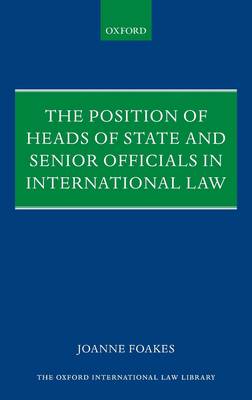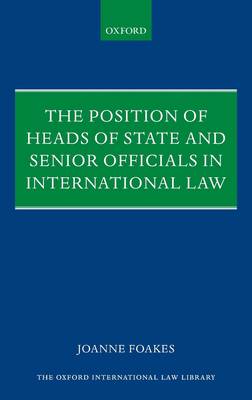
- Retrait gratuit dans votre magasin Club
- 7.000.000 titres dans notre catalogue
- Payer en toute sécurité
- Toujours un magasin près de chez vous
- Retrait gratuit dans votre magasin Club
- 7.000.0000 titres dans notre catalogue
- Payer en toute sécurité
- Toujours un magasin près de chez vous
Position of Heads of State and Senior Officials in International Law
Joanne Foakes
281,95 €
+ 563 points
Description
The legal position in international law of heads of states and other senior state representatives is at the heart of the conflict thrown up by recent changes in the international legal order. The establishment of the International Criminal Court and the ad hoc criminal tribunals reflects a growing belief that heads of states and other senior state representatives should be held accountable for serious violations of international law. It is now questioned whether foreign states and their officials still have immunity from proceedings concerning grave human rights abuses in national courts. This book provides a comprehensive treatment of this key issue, covering both civil and criminal proceedings before domestic courts and the position before international courts and tribunals. The positions of both serving and former heads of states are examined and, where appropriate, so is that of their family members. The wide variety of constitutional forms and titles enjoyed by heads of states and senior state representatives is considered and their internationally relevant powers and functions outlined. The implications of recognition or lack of it are assessed, together with the practical and legal consequences of loss of office and/or exile in a foreign state. In examining the position of heads of state and other senior representatives in foreign states, attention is given to the question of immunities before the local courts, and to other privileges, protections, and courtesies to which they may be entitled. The book draws a distinction between the personal immunity (ratione personae) enjoyed by heads of states which derive from their status or office, and the official act immunity (ratione materiae) enjoyed by all state officials. It closely examines the relationship between state immunity as it has developed under the restrictive doctrine and the immunities to which individuals are entitled. Careful consideration is given to separate regimes of international immunities such as special missions.This systematic analysis.
Spécifications
Parties prenantes
- Auteur(s) :
- Editeur:
Contenu
- Nombre de pages :
- 256
- Langue:
- Anglais
- Collection :
Caractéristiques
- EAN:
- 9780199640287
- Date de parution :
- 27-04-14
- Format:
- Livre relié
- Format numérique:
- Genaaid
- Dimensions :
- 163 mm x 236 mm
- Poids :
- 521 g

Les avis
Nous publions uniquement les avis qui respectent les conditions requises. Consultez nos conditions pour les avis.






